Issue Number 62, Fall 2023

Contents
- Last River Day by Karla Arens
- After the Darkening Trees by John Schneider
- Like the Trees by John Schneider
- Mother Earth by John Schneider
- The Abandoned City (Mesa Verde) by Dale Cottingham
- Inheritance by Scott Lowery
- Cafe Girl Meets Butterfly III by Scott Lowery
- Pandemic Jubilate by Scott Lowery
- Talisman by Dion O'Reilly
- The Verge by Barbara Parchim
- Story in the Stone by Barbara Parchim
- The Luxury of Pockets by Tricia Knoll
- Bristlecone by Marda Messick
- Planetary Defense
Double Asteroid Redirection Test by Marda Messick - Phragmites by Genevieve Pfeiffer
- Only Close by Jason Defoe
- Balance by Chris Bullard
- Process by Chris Bullard
- View by Chris Bullard
- Autumn at Work by Gail Rudd Entrekin
- Not My Real Life by Lynn Domina
- Chernobyl Exclusion Zone by Rohan Buettel
- Letter to the Sun by Skye Gilkerson
- Lamentation by Colette McHale Wisnewski
- Sharing Grapes by Karen McAferty Morris
- Forest Fire’s Last Words by John Glowney
- One Morning Last October by Carol Boutard
- Dart by Polly Brody
- The Search for Gold in Costa Rica by Anne Graue
Archives: by Issue | by Author Name
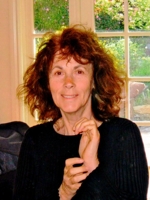
Last River Day
by Karla Arens
Karla Arens lives on the western slopes of the Sierra in Deer Creek Canyon.

In the afternoon I come down to my river
knowing that this is the last time
this season that will I lie
on this weathered rock
or swim so easily
in the swift, clear water.
And since it is certainly the last
of the river days or of my life
or of the summer that I might spend
such a casual, long hour or two
with the river just warm enough
and the rocks hot and flat, I can slip
into the sparkling coolness of it,
eyes and ears submerged below
the sounds of canyon
and the world.
I take this time, a long time with
river water stinging in my nostrils
and the touch of slick rock in hand
in pools now shallow, which, in years past
I swam quick and deep.
I collect minutes like colored pebbles
in a child’s bucket, taken home carefully
at the end of day,
and blink away the sharp scald
of sunlight striking water, blinding
for this instant, my sense of time
and my wet eyes.
I think I will hold on to all
the summer stored here as I lie,
breasts and cheek pressed against the warm
embrace of my favorite rock
and wrap my puckered fingers around the water
worn shoulders and bones of the earth
until winter tries to creep up the canyon
and into the river
the oak leaves fall.
© Karla Arens
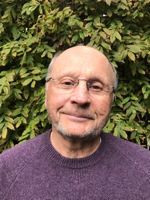
After the Darkening Trees
by John Schneider
John lives in the Wildcat Creek watershed near Tilden Park in Berkeley, California.

We welcome these hints of gold, such small swirls of light
glimpsed through cracks in autumn’s shifting clouds,
as if to mirror forgotten grief, guilt; these leaves
that once held us have started falling again.
Even this shallow lake reflects deeper than
the masquerade of summer’s wide-open eye.
And we see ourselves in a less grand light,
the sky’s softening takes us back to sensual matters:
the smooth skinned surface opening for whatever
enters it, whatever we surrender to it.
This skipped stone leaves my hand with impossible
precision, bounces with a brief evenness, again
swallowed by its own concentric circles, returning
to its place of origin. Slowly, so very slowly,
the stone I once held—like everything I thought
I knew—sinks out of reach, as I vanish back
into the shadows of the darkening trees.
© John Schneider

Like the Trees
by John Schneider
John lives in the Wildcat Creek watershed near Tilden Park in Berkeley, California.

Wandering over the Mid-Tallac with skeletal
patches of cloud, it is late October once again.
Fog from the hardening lake hangs thick as ghosts
from seasons past returned to roost.
Feathers soft as a consoling blanket
in these barren branches of aspen and sky.
Golden leaves shed their homes, fade away.
Nothing left undone. Nothing left to grieve.
They wait for the earth to close over them.
To heal what had never truly broken. To break
apart the earth into nourishment and goodbye.
© John Schneider

Mother Earth
by John Schneider
John lives in the Wildcat Creek watershed near Tilden Park in Berkeley, California.

Bending and meandering like a creek
running cursive along the fence line
keeping the wildness at bay, she rakes withered
roots and thimbleberries from a hardening
soil readying her yearlings for the encroaching
winter in this interval between fattening
and hibernation. And there is always the broken
song of the quieting creek water stumbling over
slabs of rock and smooth cobbles, all our unspoken
griefs and guilts. On the sylvan Sierra breeze,
our woodsmoke curls its message of warning,
as the mother teaches her children how to listen,
how to keep some distance. In the near distance,
scampering freely, madly, they learn how play must
evolve into survival, how weaker wood houses enough
carpenter ants for most smaller hungers. At her subtle
command, just some hoarse grunting low and sharp
as a chainsaw’s echo, they scramble back down
a towering body of sugar pine and evening light,
their shadows lengthening, their faces hooked
into question marks without the comfort of a question.
Retreating over a neighboring hillside, far from fence and
smoke, another family deepens its prints into freshly turned earth.
© John Schneider

The Abandoned City (Mesa Verde)
by Dale Cottingham
Dale lives in the Red River watershed in the southern plains of the U.S.

Already I wish I had better news,
the silence eliding my words
where at the end of their trace
what verve they possess
disperses
in some dark crevice.
I might die tonight
but just now I’m more troubled
by these rooms
linked as in an apartment block,
abandoned by those who ghost this place,
a window here, a door there
well within the wall,
a tell that they too
lived in fear.
These stacked stones
remain like signs:
a gambit it seems taken
by all those who walk earth.
Don’t we all carry a hunger
neon-shot, tongue lashed
into Ginsberg’s naked streets,
looking for a fix.
I admit
I lack courage to resolve myself.
Why else do these useless hands
rest at my side
while in great cities, little burgs,
my culture displays itself
on wide avenues,
self, the moral of where I live.
The silence I face
coalesces into a retort,
pulls me
to glimpse a new grammar
our progeny will use
to riff their critique of us,
that we did not consider the mess we leave,
that we were self-possessed:
across the land
I feel restless consciousness,
walking from being to nonbeing.
No different than the fading shadow
painting my face,
a harbinger of
harsher seasons to come.
© Dale Cottingham

Inheritance
by Scott Lowery
Scott lives under a canopy of urban hardwoods near bluffs that overlook the Menominee River as it runs toward Lake Michigan about five miles to the east. This river valley, longtime homeland of Potawatomi, Ho-Chunk and Menominee people, is now recovering from two centuries of extractive industrial land use.
Late summer has smoldered into September, baking the long grasses to a weightless, golden glow.
Brass plaques shimmer at the Badlands overlook, hot enough to raise blisters,
and dirt-blue haze hangs like a sour mood on the endless ranches, darkening the Black Hills,
blurring the Bighorns.
When we re-fuel, the breeze that skids across the blacktop brings a quick whiff of evening campfires.
Still, it takes all day under an absent sky to sink in: ever since Sioux Falls, the West's been burning.
By the time the Clark Fork leads the highway up toward switchbacks thick with bone-dry
Douglas Fir,
the gap-toothed Absaroka peaks are completely gone, though we sense their gray hulks looming like
absent gods
above our ant-line crawl through russet fields: late vacationers, sales reps, hell-bent big rigs hauling
the national grocery list.
Windows rolled-up, tuned to our own devices, but our eyes redden and sting just the same.
Finally, up and over: the sudden cold of Snoqualmie Pass, then three lanes of accelerating descent—
at the bottom, you can almost hear the hiss of hot metal quenched in the slosh and swell of
Puget Sound,
the clank of the working harbor, the moon-pull on the kelp beds, the click of round stone.
Next morning, our West Seattle host has swept her tidy deck overlooking the fog-bound ferry docks.
"This ash", she says, "is all over everything—that's what's on your car."
At the sidewalk, we see that it's still floating down, in light white flakes of nearly nothing,
casual as a shrug,
rich in pick-your-own meaning: consequence of excess, remains of passion or disaster,
the precursor of dust.
Bits of former bark or duff, drifting down on lakeside bike paths, the barbwire car lots of
Rainier Valley,
swirling like tiny white moths in updrafts around the downtown tech towers,
flecking plastic drink-bottles stacked in their manic colors behind idling delivery trucks,
graying the ginger dreads that dance around a young hobo's face by the freeway ramp.
Unbidden, a scene comes to mind in black-and-white, from one of those third-string Twilight Zones:
in tuxes and gowns, oozing greed, adult children have gathered to bicker and toast their
father's death,
only to learn of their disinheritance from the falling, incinerated scraps of the old man's money.
On our fender, what's left of last night's rain turns to a slurry of ash-fall and insect parts.
Beyond Alki Point, rows of shipyard cranes raise their dinosaur heads above the stippled
lead of the bay,
dimly lit by a red briquette of sun in a low sky of damp plaster, and the mercury rising again.

Originally published in the author's collection, Mutual Life, 2023
© Scott Lowery

Cafe Girl Meets Butterfly III
--after two pieces in a student art show, pen and ink by Echo Henn and cut paper by Dani Loomis
by Scott Lowery
Scott lives under a canopy of urban hardwoods near bluffs that overlook the Menominee River as it runs toward Lake Michigan about five miles to the east. This river valley, longtime homeland of Potawatomi, Ho-Chunk and Menominee people, is now recovering from two centuries of extractive industrial land use.

These cafe chairs knife at her shoulder blades—
they're made for pain, she knows,
then thinks of that butterfly this morning,
its ornate veins traced, sliced, spread flat
in the decorator's pattern-book
on a field of impossible stems and leaves.
She squints to picture its perfect niche
among her condo's dense ecology—
the half-bath linen? The breakfast china?
With a neon nail, she'd like to trace
those twining, razored curves
or coolly flex each cardstock wing,
admiring the helpful absence of tint so that
it's all outline: mostly void, a doily
of lobes and capillaries, tessellated
like teardrops. Blink.
For a single wing-flap
moment, she sees its paisley pattern
slapped on a rock wall: a living silkscreen,
inked in frack slurry, oil spill, firestorm.
No, absolutely not. She jabs her phone,
then one last gulp of chai as she uncurls,
tugs at her beret, late for yoga.
Across the street behind her, a man
lies prone beneath church windows,
swaddled in moist blankets. Pupal stage
of an unknown species, he's in her
blind spot, also known as the actual world—
crowd-sourced flora and fauna, streaming live.
Originally published in the author's collection, Mutual Life, 2023
© Scott Lowery

Pandemic Jubilate
after Christopher Smart
by Scott Lowery
Scott lives under a canopy of urban hardwoods near bluffs that overlook the Menominee River as it runs toward Lake Michigan about five miles to the east. This river valley, longtime homeland of Potawatomi, Ho-Chunk and Menominee people, is now recovering from two centuries of extractive industrial land use.
For I will consider my K-94 covid mask.
For it faithfully cleanses my portion of the common air.
For it is amiable, draped from the turn signal, ready for work.
For it is as easily kept in my hip pocket, and may fold and unfold, tirelessly.
For being featherweight yet unafraid in the Valley of Death, it is saintly if not Godly.
For its basic black patina is suitably somber, yet melds with any wardrobe.
For it stays crisp and dry in winter, unlike its droopy cloth cousins.
For its calibrated tug behind my ears can put me in the moment.
For its paper membrane is both fragile and tough, like any living thing.
For its cupped muzzle reminds me of the four-legged ones, that we are all related.
For it can be used to scare possums and starlings.
For it conjures the pluck of Mardi Gras, singing Jocomo Fee Nah Nay!
For it can be pulled up with a dark flourish for Walter Mitty moments at the ATM.
For its filter can be imagined as a gill, baleen or snorkel.
For thereby I can swim safely through turbulent days and weeks.
For it is an early detector of coffee breath.
For wearing it reminds me to voice charitable thoughts and hold others unspoken.
For wearing it amplifies both measure and meter of my breath.
For No Peace, No Justice! can project loud and clear through its porous shell.
For inside it there is a quiet cloister, the murmur of prayer.
For the partial eclipse it visits on the moon of the human face is often stunning to see.
For it brings an unseen smile from the food coop cashier with the pale blue hair and startled eyes.
For it wishes we really were all in this together.
For talking within it is like speaking into a tin can attached to a string attached to my previous self,
listening from elsewhere.
For when it is deployed and I am enveloped, my heart steadies, and slows, and feels some kind of
peace.

Originally published in the author's collection, Mutual Life, 2023
© Scott Lowery
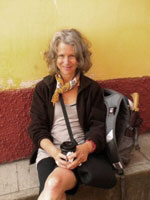
Talisman
based on consumer research conducted in Saigon
by the World Wildlife Fund.
by Dion O'Reilly
Dion lives in the Soquel Creek watershed on a stream-cut terrace covered with a thin mantle of alluvium on a ten-acre triangular plot between Soquel Creek and its tributary, Love Creek.
The rhino horn razored into peels, beaten to a powder,
a tea brewed, a man sipping it for a night of pleasure,
or mixed with lime and spring water
for acne, crows’ feet, perhaps a tonic to sweep the sludge from a gallbladder—
That’s how I imagined it—the animal, shot, and while he struggled,
the spike cut with a power saw, wrapped in wax paper,
maybe bubble wrap, maybe thrown naked into a Range Rover,
carried across the bumpy savannah with more
of its kind on a good day for starving poachers,
then loaded into boats and taken to a city, where
it ends up in the backseat of a car—
A Tesla, maybe, because people who buy the horn
are health conscious and wealthy, with strong desires
to reaffirm their social status, buy gifts for
an unreachable lover, a would-be boss, or a son’s teacher
because the horn possesses enchantment—
it makes people like you, strengthens
the silky bonds among peers, so when one
receives such a present—well, they feel properly admired. Then
there are those who store it as talisman—
a piece of legendary head, a skewer to impale a lion,
flip it into African dust— more powerful than
a blue pill, a statue of Ganesh, a pair of petrochemical vegan
shoes. Better than the biker jacket I bought, fragrant
of leather, stripped
from the pink-fatted bodies of free-range cows.

First published: Agents of Change: Art & Poetry Project
© Dion O'Reilly

The Verge
by Barbara Parchim
Barbara lives on a small farm of mixed forest, field, orchard and garden in the Illinois river watershed which feeds into the Wild and Scenic Rogue River and on to the ocean. Located in the Siskiyou mountains on ancestral land of the Takelma (Dakelma) who lived there until 1856, the 350-year-old white and black oaks, camassia (camas) fields and springs that provided forage, still remain.

between the clearcut and the creek
or the pasture and the pavement
lie unruly ribbons of land
bordered by a verge
a wild vestige - by design or accident –
harboring rusted hulks and plastic detritus
these forgotten spaces rich with life
of no particular use to anyone
where a seed falls at random and germinates
and no one notices or cares
the wren nests in a truck’s shell
and the banana slug humbly creates humus
when the farms lie idle, the cities abandoned,
and the highways are silent,
the verge holds the secret of returning -
nudges the land into reclamation
grass grows in the cracks in the asphalt,
a jigsaw puzzle of green and grey,
redwood and cedar sprout in the lumber yard
nourished by the sawdust of their ancestors
elk browse the last of summer’s roses
along the overgrown hedgerows
near the farm house moldering into the loam,
ivy overtaking the porch railings
as Charon collects the last of his silver coins
from the eyelids of humanity
a bear and her yearling cubs
loll in the window frames and doorways
blinking in the sun breaking through the fog
they breathe the new green quiet
as though they always have
and listen to the verge inching forward
© Barbara Parchim

Story in the Stone
by Barbara Parchim
Barbara lives on a small farm of mixed forest, field, orchard and garden in the Illinois river watershed which feeds into the Wild and Scenic Rogue River and on to the ocean. Located in the Siskiyou mountains on ancestral land of the Takelma (Dakelma) who lived there until 1856, the 350-year-old white and black oaks, camassia (camas) fields and springs that provided forage, still remain.

clearing the channel downhill from the spring
I found the grinding stone
half buried in the bank -
small enough for a child’s lap
the depression, too shallow for grinding acorns,
wore a rime of color,
maybe a residue of manzanita berries, chokecherries
or camas roots mixed with deer fat
the stone left behind by the acorn people
when the strange travelers came
with their wagons and tired horses
their noise and their papers claiming the land
the stone left behind
near the carefully tended camas swale,
the plank house under sheltering alders,
the willow bundles still soaking in the creek
left behind
in the company of centuries-old oaks
still weighted with the year’s acorn harvest
heavy with promise
the acorn people thinking
maybe they could return
when the circle of seasons came around again
as it had always been
the stone sits in my flower bed now,
between the sage and roses
gathering sunlight and dust
and then moonlight and rain,
the rime darkening with moisture -
the sweet relief of water
in our exodus, whenever it comes,
our eviction will be of our own design -
the sum of our excesses and failures
left behind in the fire and ash,
while under the too too hot sun
the stone endures
© Barbara Parchim
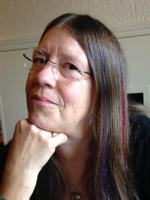
The Luxury of Pockets
by Tricia Knoll
Tricia lives in the Vermont woods on unceded lands of the Western Abenaki people.

Do you remember old clothes cast off?
Their hemlines, necklines, touch-sense
of nubby wool, velour, fine linen
or cobalt blue. Recall pockets.
Not deep ones as in gold coins.
Not cut-corners of apparel
with none at all. Yes, the banquets
of secrets, hands in deep softness
like notes to self, like mothers.
For retreats and receipts of deeds done.
Where a key hides from the public
or the fist has its say without fighting.
Maybe well-worn wide-wale corduroy
where lint lurked in the bottom. The hollow
for the dog biscuit in the down jacket
that the puppy chewed its way into.
You hide from January’s chill gloveless
or remember sadness when hands forget
what else to do next. The benevolence
of plush that feels like prayer.
Those gifts we gave to good souls,
the offerings of old t-shirts
to children in refugee camps
with lives threadbare of walls
who hold shallow bowls, drink doubtful water,
sleep with sick siblings and worried fathers,
and wear charity sweatpants empty
of the pebble treasures of childhood.
© Tricia Knoll

Bristlecone
by Marda Messick
Marda lives on richly bio-diverse land that is the ancestral territory of the Apalachee Nation.

A forester, a woman in her twenties,
hair pulled back, a good shot,
or someone like that
who breathes easily at the altitude
of the Ancient Bristlecone Pine Forest
where, she knows where
still lives the Methuselah Tree
four thousand eight hundred and four years old,
location in the grove undisclosed
because who doesn’t want to stand
before the oldest life on earth
and take just one needle and a selfie
so in the dusk of a day with weather
coming in fast along the ridge,
she walks the trail in the stripping wind
and stops where she’ll never tell
and removes her boots to stand
beyond the roots on holy ground
before Methuselah,
a park ranger with a badge and a vow,
a priest of the trees of the world.
© Marda Messick

Planetary Defense
Double Asteroid Redirection Test
by Marda Messick
Marda lives on richly bio-diverse land that is the ancestral territory of the Apalachee Nation.

All the giant telescopes of the earthlings
point seven million miles counting down the last seconds
of fourteen thousand per hour
ten months and
three hundred thirty million dollars
the cost to toss a dart in a long shot arc
like a snowball
flung by a strong bully boy
to hit an asteroidal moonlet
now trailing a tail
six thousand miles long
so when in future a space-time offender
helter skelters toward the earth
like a movie of apocalypse
or that day in the Paleogene
when Tyrannosaurus looked up
for one last instant
before extinction
we have the skill to knock it
with a pool shark shot
into an orbital pocket
and save the world
if by then there is a world
any heroes to do the math
or dancers for the victory dance
© Marda Messick

Phragmites
by Genevieve Pfeiffer
Genevieve is a PhD student in English with a focus in the ecohumanities at University of Oregon, located on Kalapuya Ilihi, the traditional indigenous homeland of the Kalapuya people. Having recently moved to the West Coast, they're happily hiking in the mountains, running trails, and cycling along the coast.
I can’t stop thinking about what you said the other day
about a man—or a woman—someone—in Auschwitz, who wrote a letter
how you couldn’t remember the whole thing, only a line:
if I never make it out of here, know that ________ existed.
Except you can’t remember their name, and I can’t find it online
but found plenty of photos of men who wear 6MWE T-shirts,
on each shirt an eagle grips a bundle of sticks around an axe
in its incredible, undiscerning talons.
And as I drive I think of the sweatshirt that read work brings freedom,
how my father worked from six in the morning to ten at night
and taught me how to use an axe to chop firewood. How they turned
the yellow and black of the bee that drinks nectar, pollinates and scatters life,
how they made those colors hateful.
I’m here on the interstate, in the setting sunlight that slants at just the right angle
and slides through the tufted tips of golden grass. White droplets of grain
catch in the yellow glow of the dead reed. And I don’t know the plant’s name either,
or whether it will survive this latitude in fifty years. Oh, I think. I’m so sorry—
I don’t know your name.

© Genevieve Pfeiffer

Only Close
by Jason Defoe
Jason lives among blue jays, ducks, hawks, and herons on the banks of Pike Creek in the Great Lakes watershed. It is a flat and fertile land nestled between Lakes Erie and St. Clair near the southernmost tip of what some call Canada.

What is near glows:
the blood red
of the maple;
the golden death
of leaving.
What is far fades:
trees dissolving in air
like leaves in tea;
horizons smeared eternal
or erased.
We are seasoned here,
prepared for —
what is to come.
Hold tight to what is close,
what is real;
steady your gaze on this;
allow what is yet far off
to stay hidden.
This fog is a blessing,
a sacred shroud
shielding us
from what cannot be
endured.
© Jason Defoe

Balance
“Now there are so many eagles that there is a not a natural balance and they have this unlimited killing field....” The New York Times, June 9, 2021.
by Chris Bullard
Chris lives in a large, brick-faced building in the center of Philadelphia. He copes by growing tomatoes, peppers, sunflowers, potatoes, and corn on a plot in a community garden on the bank of the Schuylkill River.

Too many
eagles
is a concept
that I don’t
understand
fully.
It’s like
saying too many
Americans.
Oh, I see.
© Chris Bullard

Process
by Chris Bullard
Chris lives in a large, brick-faced building in the center of Philadelphia. He copes by growing tomatoes, peppers, sunflowers, potatoes, and corn on a plot in a community garden on the bank of the Schuylkill River.

Soil generates
forest
from the idea
of forest.
Seeds and rootstock
do not bear
the blueprints
of pasture,
but carry designs
programmed
into their being
for ascendancy.
After clearcutting
and wildfire,
trees reach
again sunward,
acting as they
were conceived to do,
interlocking
in a single green mind,
that never loses
the thought
of what it was
and what it must be.
© Chris Bullard

View
by Chris Bullard
Chris lives in a large, brick-faced building in the center of Philadelphia. He copes by growing tomatoes, peppers, sunflowers, potatoes, and corn on a plot in a community garden on the bank of the Schuylkill River.

From my apartment window,
I catch the river as an emptiness
between the industrial assemblage
on the east bank and the brick
row houses on the west, a narrow
space as unremarkable as a crack
running through crumbling masonry.
But when the angle is right,
the sun’s incandescence strikes
that gray surface, transmuting
its bleakness into extraordinary light,
as the wandering of water ignites
into newfound, fiery eminence,
like a lost god restored to his throne.
© Chris Bullard
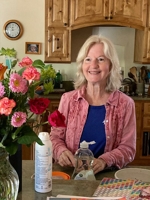
Autumn at Work
by Gail Rudd Entrekin
Gail lives amid the Coastal Range east of San Francisco Bay in the San Pablo Bay watershed just above San Pablo Creek on lands of the Chocheno and Karkin Ohlone people.

She’s a wild woman. Leaves in
her hair. Like she just got up from some
crazy roll in the hay. No one sorts
her closets or her kitchen drawers
and you can’t find a damn thing
at her house: silver buckles hanging
from kitchen cupboards, satin shoes in
the potted plants, summer zucchinis
spoiling from the chandeliers. She’s
been out in the studio throwing paint
at the trees in a frenzy of inspiration.
Look at that scarlet one all flecked
with verdigris, those ochre heads
throwing themselves around in the wind
in front of that lapis lazuli sky. She’s
got deadlines and the pressure is beginning
to get to her. So many leaves, so little time.
That creep Winter is on the road
with his fancy suit and critic’s eye,
getting ready to pan her work
with his icy wit and slick finality,
always has to have the last word.
Reprinted from the author’s new collection Walking Each Other Home
© Gail Rudd Entrekin

Not My Real Life
by Lynn Domina
Lynn lives on the shore of Lake Superior, the largest freshwater lake in the world, measured by surface area. Lake Superior contains 10% of the world's fresh surface water, and its underwater visibility reaches, in some spots, nearly 100 feet.

It’s just a TV show, not my real life
when the lion thrusts its entire head
into the zebra’s carcass. The blood
looks so red, I think, because it contrasts
so vividly with black stripes, the white
belly. The lion chews patiently, licks its paw,
seems to suck at something I can’t see.
It’s the way of nature, my daughter said,
predator, prey, the powerful, the violent,
stalking like gods those of us who survive
through camouflage or armor
or our willingness
to play dead.
© Lynn Domina

Chernobyl Exclusion Zone
by Rohan Buettel
Rohan lives in Australia’s bush capital, nestled in the foothills of the Brindabella range beside the Murrumbidgee (Australia’s second-longest river) on land whose traditional custodians are the Ngunnawal people.

In the red forest we abandon time,
humans retreat from the zone
of alienation, where pine trees died
from high doses of radiation,
bulldozed and buried in trenches,
covered with sand and replanted
with saplings. Yet, with people gone
wildlife can flourish, find habitat:
wild boar and beavers, wolves and deer,
storks and eagles brave the roentgens;
soil contaminated by strontium ninety
and caesium one three seven —
half-lives of thirty years.
Endangered species gather, find refuge
in the reserve. Despite stunted plants,
stunted tail feathers, biodiversity grows
in the places where people don’t go.
© Rohan Buettel

Letter to the Sun
by Skye Gilkerson
Skye is a visual artist who was raised in the endless quiet of the Great Plains and slowly made her way to the Hudson Valley, where her house perches on a hill overlooking Rondout Creek.
I’d like to know you in eight billion years, after the effluence has extinguished and you’re a smooth black globe, polished through your own force of gravity. What I’ll want to ask is whether in all that compressed carbon resides the memory of our epoch, those years of salt water and blood, rain clouds and chlorophyll and peach blossoms, giant sloths and pygmy deer and crocodiles and the internet, pine needles and spaceships and nerve endings and democracy. After our oceans have evaporated at your intensity, will you still remember that time when everything was perfect, penetrating closed eyelids with Ferris wheel ribbons of flame, and, even on a snowy day, warming my face?

© Skye Gilkerson

Lamentation
by Colette McHale Wisnewski
Colette lives in the Deer Creek Watershed in rural Will County south of Chicago. Her daily walks loop through grasses, prairie plots, wetlands and wooded sanctuaries offering intermittent moments of reflection, a respite from the noise and busyness of the world.

In brittle browning forests
in rural woodlots and city parks
ashes fall
marking our mourning time
windbreak litters the path
of our walking lamentation
under the harsh glare of unfiltered sun
through the gaping canopy
a tinder of lost nesting
smoldering in our hearts
a knell of hungry woodpeckers
hammers the dying bore-riddled trees.
© Colette McHale Wisnewski

Sharing Grapes
by Karen McAferty Morris
Through live oaks with twisted trunks, Karen’s backyard view is Perdido Bay in the Florida panhandle. From her swing overlooking the water, she can watch dolphins and great blue herons.

Along my scuppernong arbor,
from spring’s green buds
through summer sun and storms,
the vines cling to their tightrope
and by September swell into a circus
of hazel clusters.
At harvest time, I make jelly,
boiling, mashing, straining, pouring
into diamond-patterned glass jars,
of shimmering topaz that return summer
at every opening.
I wonder if in the autumn darknesses
a possum, her thumb-size babies
drowsing in her pouch, wanders under it
and discovers a few fallen grapes,
and if the soft-mailed armadillo’s long sticky tongue
savors their dessert sweetness
after digging for grubs.
In my imaginings they roam under it,
far from the whirr of highways,
acres of asphalt, flashing neon lights,
an ordinary evening for them,
carrying on their carefree lives,
sweetly devoid of gratitude or curiosity,
shuffling through moonlight and shadow,
a sight that would catch my heart
in an aching wonder.
© Karen McAferty Morris
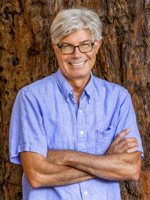
Forest Fire’s Last Words
by John Glowney
John lives close to the shores of Lake Washington, a ribbon lake formed by the southern flow of the Puget lobe of the Cordilleran Ice Sheet near the end of the Late Pleistocene, looking out at Mt. Rainier, an active stratovolcano in the Cascade Volcanic Arc.

--a pine tree
scrawls smoke’s
delirious
epilogue
before fire’s pursuers,
exhausted chainsaws,
Pulaski’s in hand--
the full story
hard to pull out
of the charred acres
spark that ran to the river
spark high on old bark
spark that got lost in the willow grove
smolder of stump
shudder of ash
black and white
words
scorched air
the fleeing wolf
sniffs.
© John Glowney

One Morning Last October
by Carol Boutard
Carol lives in a small village at the northern end of Upstate New York’s Keuka Lake, which derives its name from the Iroquois phrase “Canoe Landing.” Tucked into hardwood forest, her small plot is often occupied by deer, fox, turkeys and magnificent native marmots.

I watched a hawk begin to die.
Caught up in the rusty scent of autumn,
I was startled when it fell from the sky.
Before me, the white and sable flecking
of its adolescent plumage—
colors of river gravel and fall meadow,
but already, sharp contempt in its golden iris,
the imperial stare assessing me
as I stood nearby, hugging the mail
from the box at the end of the drive.
Here was this burly raptor,
armed with the curved dagger of its beak,
a gladiator’s poise, inured to the staccato
of sparrows and wrens gathering to sound alarm,
its aerial body so out of place,
no longer flying overhead, sweeping the heavens.
Hawk crouched, wings half-spread,
cocked for take-off, as if to rise skyward
and drag the farm up with it in its black talons.
It lifted only to drop again, anchored
by lead shot burning deep within its chest
as it called out its bright distress.
Pausing on the crest of the valley today,
I follow red-tails caught
in afternoon light, stretched above the wetland,
buoyed on the upcurve of their wing tips—
free to fly high enough
to spot the curve of the horizon, or glide down
and go close enough to learn
what danger my neighbor is pointing at the sky.
© Carol Boutard
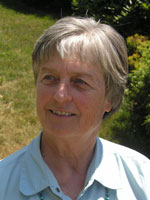
Dart
by Polly Brody
Polly lives in an exurban Connecticut town, about 500 ft. above sea level, about an hour's drive inland from Long Island Sound. Every year she listens from her window for the first chiming peep of spring hylas that give voice to a pond, just within hearing.

Waxwings spew from the Bradford Pear,
a streaming torrent of wings
spills over the shopping center
and suddenly, bursts apart
like the exploding sky-chaff
of July fireworks.
The charcoal dart from heaven
that sent panic out of the tree,
scatters that eruption now
to every point of the compass—
a Merlin.
Merlin, now homing on one bird,
the confusion of many dispersed,
zigzags over the huddled cars
pinned to the jinking flight of its prey,
a heat-seeking missile
avid for pulsing flesh.
Shoppers wheel carts with confident leisure,
their eyes pinned ahead
to the self-opening doors of market.
The Merlin strikes, talons stretched forward—
hunter and hunted one clutch in the air.
Inert captive clasped
tight to its breast,
boomerang-winged raptor
scythes toward the horizon.
© Polly Brody

The Search for Gold in Costa Rica
by Anne Graue
Anne lives in the Lower Hudson Watershed in New York, which makes up about 40 percent of the larger Hudson/Mohawk River Basin. The area is dotted with small lakes and is not far from the Croton Reservoir.

Under mist and compost
far below the canopy,
wet undergrowth your shelter—
flash flicker—glistering gold—
a nanosecond—a golden
toad—you drink
through your skin the mists
once heavy, laden, hovering
over the warming earth
El Niño threatening
in the new world—
your world of orchids
hanging roots down trees
bromeliads where you lay
your eggs in cisterns
of water collected from clouds
surrounding the rich coast
where you were found
stellar in 1964
seen last in 1989
at Monteverde
where you had lived
on your estate molten
lava bursting rain
forests howler monkeys
sloths and poison-dart frogs
toucans and the fungus
that the climate brought
with it that hurt worse
than Columbus who left
you well enough alone.
© Anne Graue